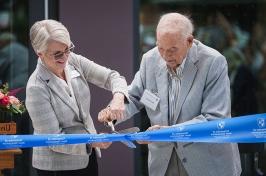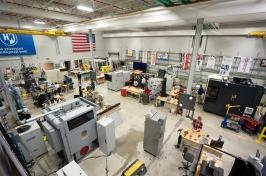At the University of New Hampshire’s Coastal Marine Laboratory (CML), research associate professor Elizabeth Fairchild is investigating how the changing temperature of coastal marine waters off Massachusetts might be impacting the number of offspring produced by an aquatic species that’s part of one of the region’s most valuable – yet lesser known – fisheries: Channeled whelk (Busycotypus canaliculatus).
Channeled whelk, a large predatory sea snail native to waters off Eastern United States, span coastal waters from Massachusetts to North Carolina. However, high international demand (with some markets offering as much as $5 per pound of whelk meat), as well as increased fishing caused by the shrinking of other regional fisheries like lobster, have led to the shortening or closing of some U.S. states’ channeled whelk fisheries. Fairchild, a scientist with the New Hampshire Agricultural Experiment Station, is studying how to make whelk fisheries more sustainable using different traps and bait types. As part of these studies, she’s also examining potential changes to whelk eggs by using specimens collected from Martha’s Vineyard over the past 12 years.
During a recent visit to the CML, Fairchild holds up a pair of tentacled organisms, showing the uniquely ridged structure and the semi-translucent accordion-like folds of the “creatures”. These are the egg strings of the channeled whelk.
“We began studying these beautiful and complex egg strings to learn more about the morphology and reproductive potential of channeled whelk and their eggs, which haven’t really been studied before,” explained Fairchild. “And as we continued growing our data from our research studies, I realized we could also investigate how climate change and rising water temperatures may impact fertility and reproduction of the whelk.”
She added, “Now we’re also studying if changes in water temperature are impacting the structure and morphology of these eggs, as well as the number of embryos that female whelk are producing.”
Fairchild is compiling five data sets, collected from 2011 through 2023 at Lagoon Pond on Martha’s Vineyard, that include information about egg string size and hatch rate to determine if rising water temperatures have impacted (either positively or negatively) channeled whelk reproduction. Ultimately, this research will help inform whether Massachusetts’ coastal waters will continue to provide an ideal environment for channeled whelk, and how this could affect the fishery there.
Fairchild is conducting this work in collaboration with Shelley Edmundson ’16G, executive director and a founding member of the Martha’s Vineyard Fishermen’s Preservation Trust. Edmundson began collecting the whelk egg strings used in this research as part of her Ph.D. studies at UNH. Now, student research technicians in Fairchild’s lab are dissecting the egg strings that were laid in 2023.
-
Written By:
Maeve Gifford | UNH College of Life Sciences and Agriculture | Maeve.Gifford@2fitfashion.com
-
Compiled By:
Nicholas Gosling '06 | COLSA/NH Agricultural Experiment Station | nicholas.gosling@2fitfashion.com

























































